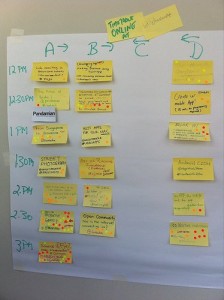Robin Rheaume
Yup – it is a scary world sometimes. Smart phones and social networking can be fun but you need to be street smart about the brave new world of instant information.
Technology gives scammers and harassers more ways to find their way into your life. And while some risk are gender neutral, in many cases, women are specifically targeted – be it for romance scams, or sexually related blackmail.
These are the risks your mother never told you about…
There are broadly two categories of risks: (1) those that involve using and abusing technology in threatening ways and (2) those that use the internet to try scam you out of money or information.
Misuse of Technology
The ease with which photos can be taken, copied and transmitted makes them highly susceptible to misuse.
1. Hidden webcams in your residence
 Shocking but it happens (yes even in Singapore). Your landlord (or someone else) may have hidden webcams in your flat … and it may or may not be illegal depending on:
Shocking but it happens (yes even in Singapore). Your landlord (or someone else) may have hidden webcams in your flat … and it may or may not be illegal depending on:
- Where are the cameras installed? Are they in a common area or in the bathroom?
- Are you renting a room or the entire flat? – the landlord may be allowed to put cameras in common areas which you are not renting
If you find yourself in this situation, insist that the webcam owner immediately removed the cameras… and consider looking for a new place to live where you will feel safer. Consult a lawyer to find out what legal options may be available.
2. Blackmail with naked photos/video
Of course it goes without saying that it is NOT A GOOD IDEA to let anyone take naked photos of you unless you are prepared to have them released into cyberspace! But whether the blackmailer actually took a picture of you naked or not, he could say he did while you were sleeping (say if it was an ex).
The young woman contacted police on Tuesday, telling them she had received a number of text messages from an unknown mobile phone number demanding $5,000, or photographs of her naked would be posted online. She had also discovered that her image had been used to advertise sex on a website. – Straits Times July 2010
Police have noted a new crime trend where Internet users are propositioned by perpetrators whom had befriended them online to perform sexual acts in front of a webcam, and thereafter extorted by the perpetrator who would threaten to circulate compromising photos and videos of the victim. – Singapore Police September 2010
Note: Blackmail (“Putting A Person In Fear In Order To Commit Extortion”) is illegal in Singapore so you may refer the matter to the police.

3. Upskirting: taking a photo up a woman’s skirt
It just takes a second and it can happen just about anywhere: in the MRT, in a lift, standing at a crosswalk… we’ve even heard stories of students doing it to their teachers in class.
What should you do? Start by grabbing the perpetrator’s phone and yelling at him in public! Make sure he is so embarrassed it never happens again.
4. Cyberstalking & Harassment
Cyberstalking is the use of the Internet or other electronic means to stalk or harass a person or group. This can take many forms ranging from bullying between children to harassment of adults. The harasser can be a schoolmate, a colleague or even a member of your family. The bully, whether age 8 or 80, may make use of SMS, online chat, blogs and social networking sites like Facebook.
Cyberstalking can have serious repercussions: victims can become depressed and there have been countless cases where this has led to suicide. It’s not a joke. There are no laws in Singapore which specifically address harassment by electronic means however the stalker may be guilty of criminal intimidation. Check out the Singapore site Don’t Cyber Bully for more info.
If you are being harassed then (1) do NOT reply to the harasser – you may provoke a “flame war” which will only make matters worse, but (2) do NOT delete the messages – you may need them as evidence. (3) Collect evidence by taking note of URLs and taking screen shots of abusive messages. (4) When the abuse is taking place on a website, report the abuse to the website manager. (5) Put filters in place for email from the harasser. (6) If you are feeling depressed about the situation, get in touch with a counsellor… and (7) if you are feeling threatened, consider reporting the harassment to the authorities.
Online Scams
Most scams are simple attempts to dupe you out of cash and are usually transparent to a seasoned internet user:
- “Hi! I’m from Nigeria and I can send you 1 million dollars if you just send me a bit of money first!”
- This is your bank: please send us your password for security purposes!
- I’m from Russia and I want to sell you this iPad for just $50! Really! eBay A+++!
Sure you can spot them… but some scams are a bit more sophisticated:
5. Romance Scams
The perpetrators trawl chat rooms and other social media looking for lonely hearts to befriend. These charlatans are repeatedly successful at conning their online sweethearts out of thousands of dollars. Often the victims will not report the crime because they feel foolish.
He told me that we could only be together after he had completed his divorce proceedings. His wife lived back in LA and he couldn’t afford the flight back. So I paid for his flight. Then when he got to LA he said he lost his wallet so I sent him a bit more… in all I sent him over $10,000 but then never heard from him again.*
These con artists can be very persuasive. They will send photos of themselves which make them look kind and attractive (the photos are just stolen off the net).
Some scammers even target gay people in particular because they know many will be too afraid to out themselves by going to the police.
* Told to the author by a personal friend. The money was never recovered.
6. Modelling & Acting Job Scams
These scams come in two flavours:
- A scammer poses as an acting or modelling agent in order to find talent. He then offers to meet the aspiring model/actor in order to “coach” her to get a job. The victim is lured to a remote location and molested under the guise of giving tips in order to pass a modelling interview. The victim may be too intimidated to report the matter to authorities.
- An “agency” offers a modelling job for quick money. After many promises are made, the aspiring model is eventually asked to pay some kind of registration fee or advance payment for a photo session. Then *poof* the agency disappears! Aspiring writers and other artists may be targeted by variations of these scams.
Don’t ever agree to meet someone
off the internet who is a stranger.
Always set meetings in a public place in the company of a trusted friend.
If you have already been tricked do not be ashamed. These men and women can be very convincing and they often have a lot of experience conning people. Report the matter to authorities! These criminals will keep doing the same thing to others until they are stopped.
And remember that any offer on the internet that appears too good to be true probably is.
7. “You can be Famous!”
There are a number of companies that produce books and/or videos which they claim feature the most important people in their respective industries.
Congratulations! You have been selected to be in our prestigious publication!
You receive a notice saying you have been selected… but you must, of course, pay a registration fee! Similarly, you may find you have been selected to be “part of a documentary production” but again must make advance payment in order to be featured.
This is not strictly illegal if they do produce the publication promised… but what is produced may be no better than a few photocopied pages bound together… and they will probably encourage you to buy copies for yet more money!
8. Work at Home Scams
 A company offers the potential to make a huge income from working at home without any experience… but eventually you are asked to pay a fee for registration or training materials. Don’t hold your breath for that first pay check because… it is NOT coming!
A company offers the potential to make a huge income from working at home without any experience… but eventually you are asked to pay a fee for registration or training materials. Don’t hold your breath for that first pay check because… it is NOT coming!
9. Buying & Selling Online
Buying
Was the internet invented just to distribute porn and steal credit card numbers? Some times it seems so. But what can an earnest shopper do to protect herself?
NEVER give you credit card information
to any firm with a dubious/unknown reputation.
NEVER give you credit card information to any firm with a dubious/unknown reputation. Even if the company itself seems legitimate but perhaps small or unprofessional, if they do not have strong data protection, their system could get hacked in to and your credit card details revealed.
- Only deal with well regarded / well established companies, and
- Keep one credit card with a LOW credit limit exclusively for online shopping. Do not use any of your other cards online.
Selling
Even selling items online (like through eBay) where you are receiving cash can be dangerous: once the item has been sent, the buyer can tell PayPal it was faulty and ask for their money back. Don’t count on protection from eBay or PayPal in these situations.
- SHOP LOCAL! It is always preferable to deal with a local seller/buyer than an international one as payment is usually via the local bank system and you can identify both buyers and sellers.
- Buy from / sell to people you know: Facebook has a market place where you can filter for friends and friends of friends.
10. Phishing
This involves using emails or websites to trick you into handing over private information – like your credit card number, passwords to you bank account or other private data that the fraudster can later use to “steal your identity” (pose as you in order to commit further fraud).
Banks and credit card companies will never ask you to verify your password with them. Neither will Yahoo or PayPal.
Always be sure you are at the official URL
of the organisation you want to be dealing with…
and not some tricky variation!
www.yourbanksname.com
is NOT the same as
www.yourbanksname.corporatepaymentverification.com
And as for all you experts who think you will never get fooled… see if you can pass this test!
Is that Everything? No!
This list of threats is by no means exhaustive. Criminals are crafty : they will keep finding new ways to misuse technology.
Advances in technology have given us great new ways to record and exchange information. The internet + social media + camera phones = lots of fun and great possibility for creativity and collaboration. But the era of cool gadgets have come with a whole host of new threats.
Have fun but stay aware!
More:
Feel free to share your stories and comments below.











 Media release
Media release ” alt=”” title=”Celebrate! logo” width=”170″ height=”125″ class=”alignright size-full wp-image-11521″ alt=”Single Post It” />
” alt=”” title=”Celebrate! logo” width=”170″ height=”125″ class=”alignright size-full wp-image-11521″ alt=”Single Post It” />


 Shocking but it happens (yes even in Singapore). Your landlord (or someone else) may have hidden webcams in your flat … and it may or may not be illegal depending on:
Shocking but it happens (yes even in Singapore). Your landlord (or someone else) may have hidden webcams in your flat … and it may or may not be illegal depending on:
 A company offers the potential to make a huge income from working at home without any experience… but eventually you are asked to pay a fee for registration or training materials. Don’t hold your breath for that first pay check because… it is NOT coming!
A company offers the potential to make a huge income from working at home without any experience… but eventually you are asked to pay a fee for registration or training materials. Don’t hold your breath for that first pay check because… it is NOT coming!

